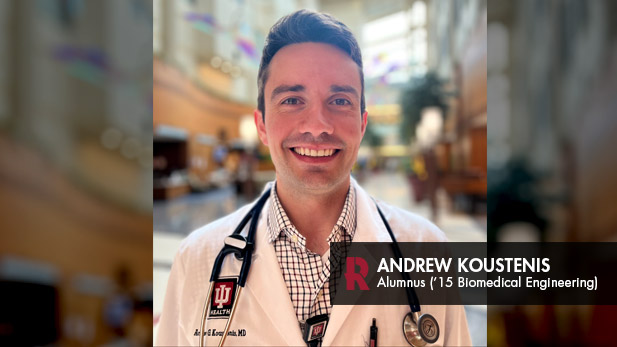Rose’s Biomedical Engineering Education Prepared Andrew Koustenis for Medical School and as a Physician

Andrew Koustenis, a Rose-Hulman 2015 biomedical engineering alumnus, chose a biomedical engineering major to pursue both engineering and medicine. “The education you get at Rose is excellent,” said Koustenis.
From a young age, Andrew Koustenis, a Rose-Hulman 2015 biomedical engineering alumnus, enjoyed applying science to practical solutions. During his junior year of high school, the Indiana native decided he wanted to pursue a career in medicine and eventually become a physician. He also had a love of engineering. So, when it came time to choose a college that would fit his needs, Koustenis turned to Rose-Hulman.
“The education you get at Rose is excellent,” said Koustenis. “The faculty members are some of the best in the country in engineering, math and science, and the school creates a positive learning environment for students in very rigorous fields. … There’s a reason Rose-Hulman has been ranked the No. 1 engineering school for 25 years.”
Koustenis chose a biomedical engineering major to pursue both engineering and medicine. As he went through medical school, residency and now as a practicing physician, he still returns to the foundation of his undergraduate years. Specifically, taking the math and science principles and problem-solving skills he learned at Rose and applying them to practical, real-world solutions.
Koustenis attended Indiana University (IU) School of Medicine and served his residency at University of Kentucky in Lexington, with a specialty in internal medicine. In August 2023, he joined IU Health North Hospital in Carmel, Indiana, as a hospitalist, as well as assistant professor of clinical medicine at IU School of Medicine. As a hospitalist, Koustenis practices medicine in the hospital itself and sees patients who are admitted for a broad range of medical conditions. He was drawn to hospitalist work because of the variety and acuity of patients in a hospital versus outpatient care. As a hospitalist, compared to a sub-specialist, Koustenis sees many different disease processes and can treat different types of conditions. He believes strongly that his Rose education helps how he approaches patients.
“I see a lot of parallels between the engineering discipline and being a physician,” he said. “The day-to-day work is very different, but the skills you need are the same — problem-solving and approaching a complex problem with multiple systems at play. For example, an engineer may be designing a device that has mechanical system that needs to interact with an electrical system and function together to make the product do what it’s designed to do.”
“That’s very similar to when I treat a patient. I have to understand how different organ systems in the body work and interact with each other. And if one organ system has disease, I have to know how that affects other organ systems. It’s all about understanding how complex systems interact and problem-solve.”
Koustenis also believes Rose’s emphasis on team learning prepares physicians for work their work in the field.
“Every day, I work with other physicians, hospitalists, sub-specialists, nurses, physical and occupational therapist … it’s very much a multidisciplinary team sport and you have to work well as a team to treat the patient,” he said. “That’s something Rose-Hulman really emphasized through group projects at the beginning of my years all the way to the senior design project. We had to take large volumes of work and divide and conquer.”
Koustenis appreciates that while Rose has a very rigorous academic schedule, students were encouraged to participate in extracurricular activities. He was a tutor with AskRose Homework Help, which he used back in middle school and how he first learned about the college. Koustenis was also a tutor in the library, president of Tau Beta Pi engineering honor society, founded the Beta Beta Beta biological honor society on campus, and a member of Alpha Chi Sigma chemistry fraternity. He was also a member of the Premed Society Club, and played violin and performed several times in Hatfield Hall and the White Chapel.
Having an impact on patients and helping them navigate the stressful situation of being in a hospital is what Koustenis enjoys most about being a physician. Additionally, he continues to enjoy taking the skills he learned at Rose with an engineering education and applying them to patient care and problem-solving.
“Every patient I see is different, even patients that come in with the same disease process, they have other comorbidities,” he said. “It’s really rewarding to work through those and see each patient as a new challenge.”